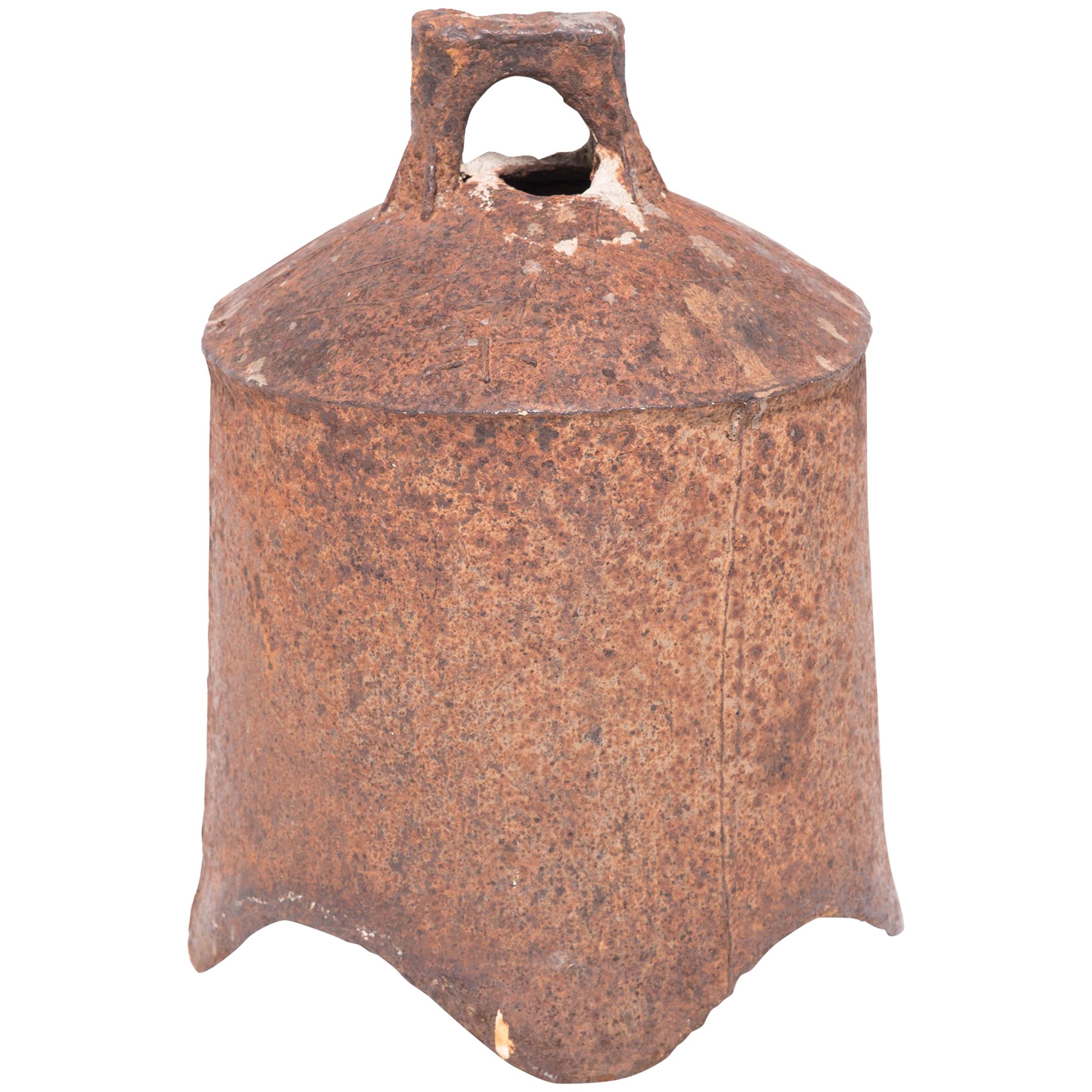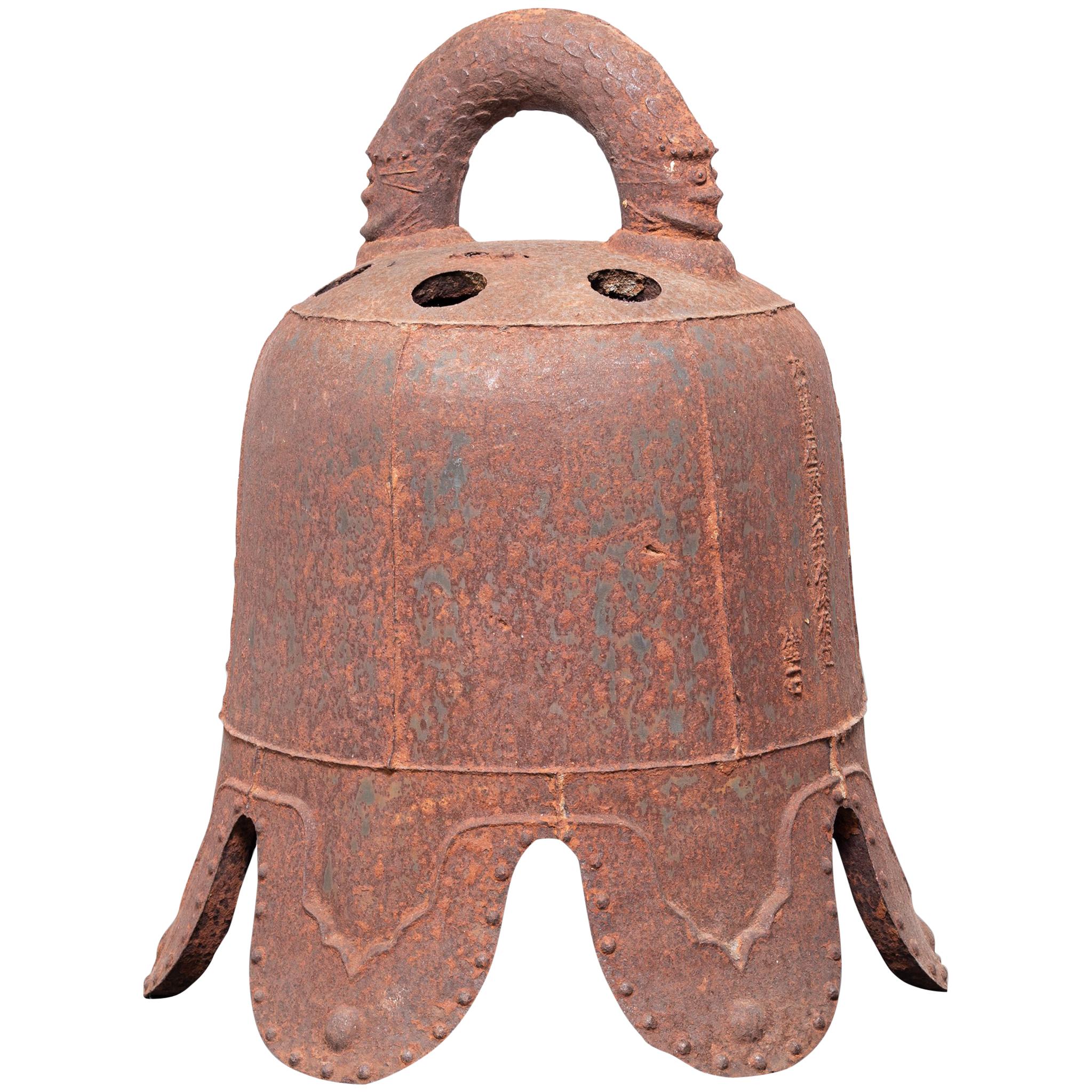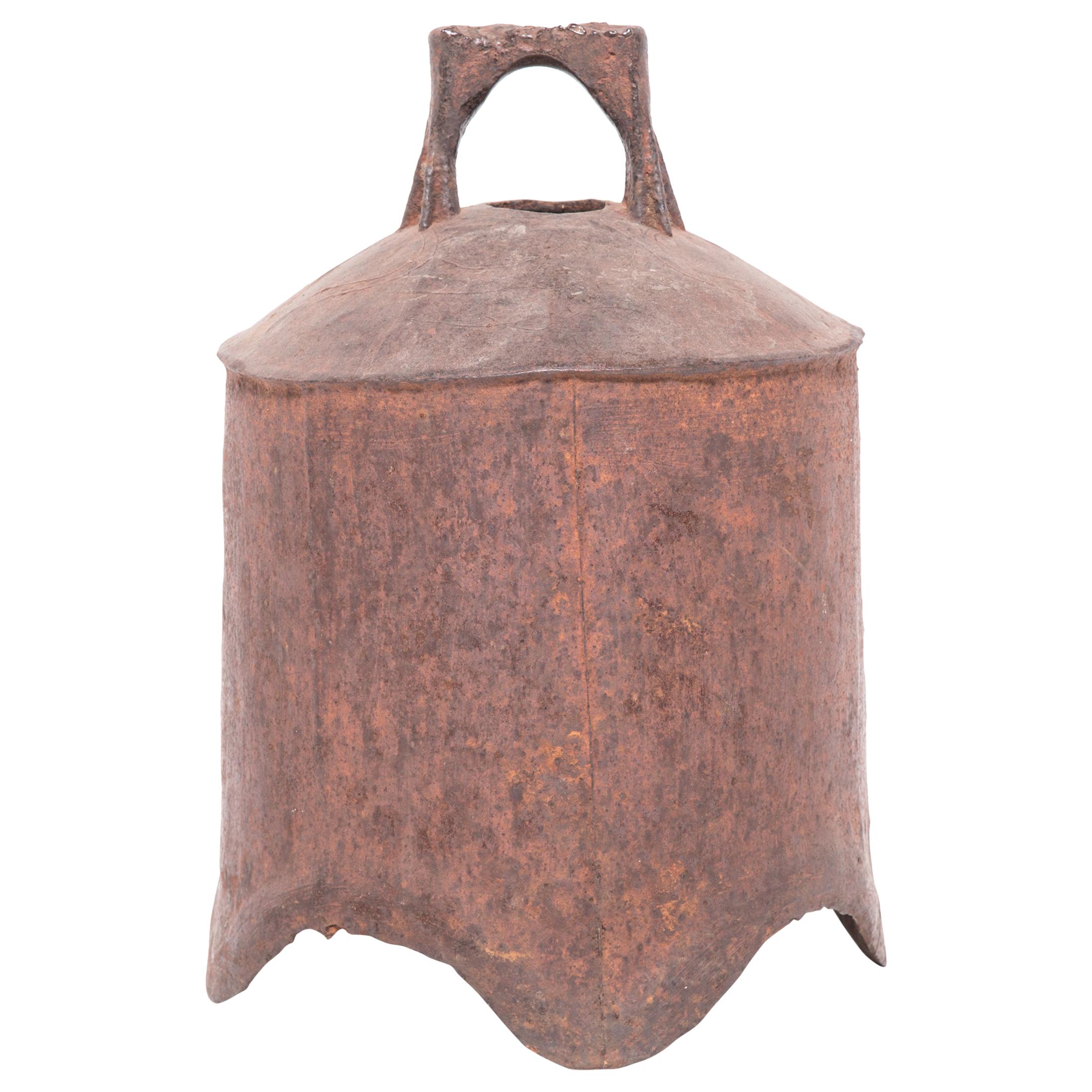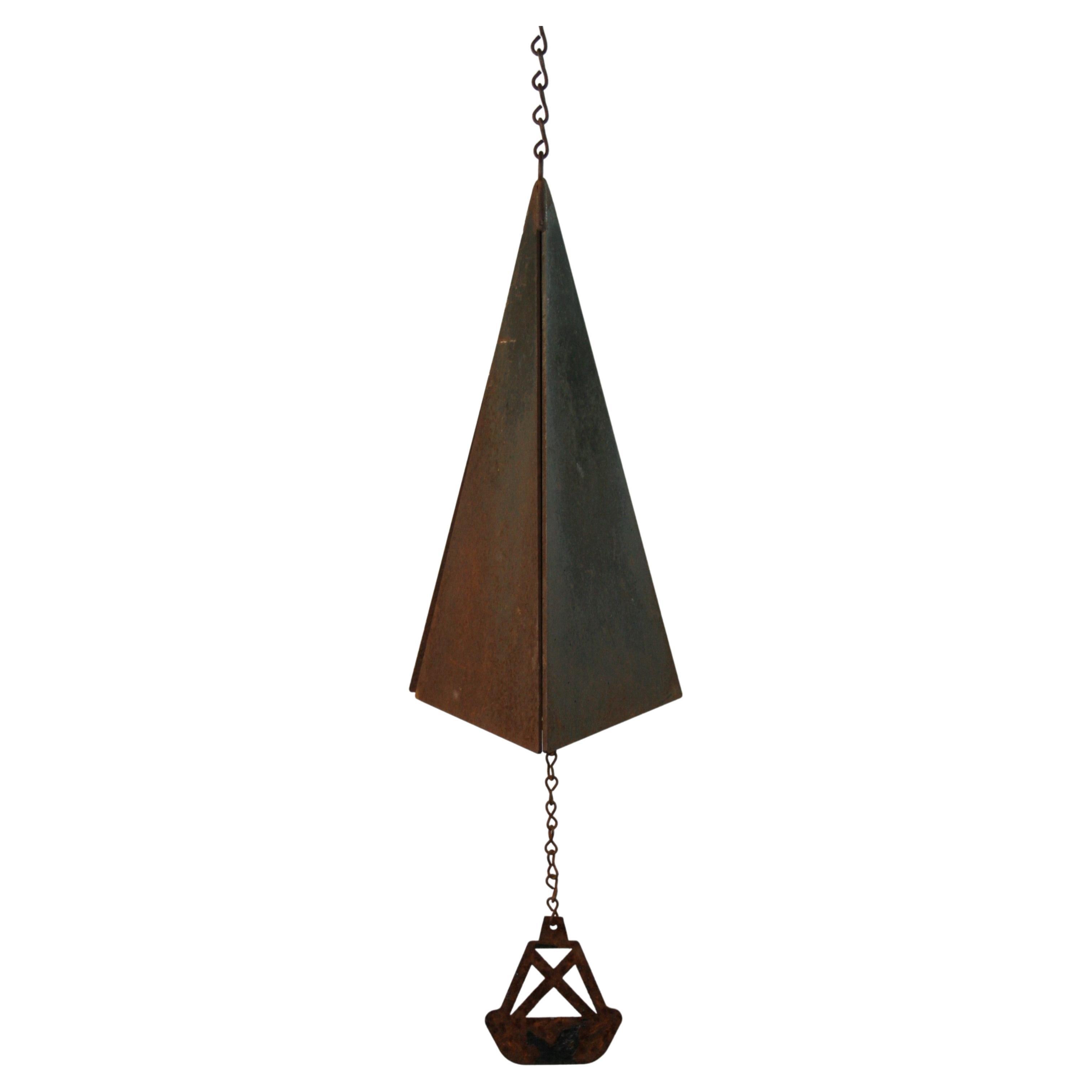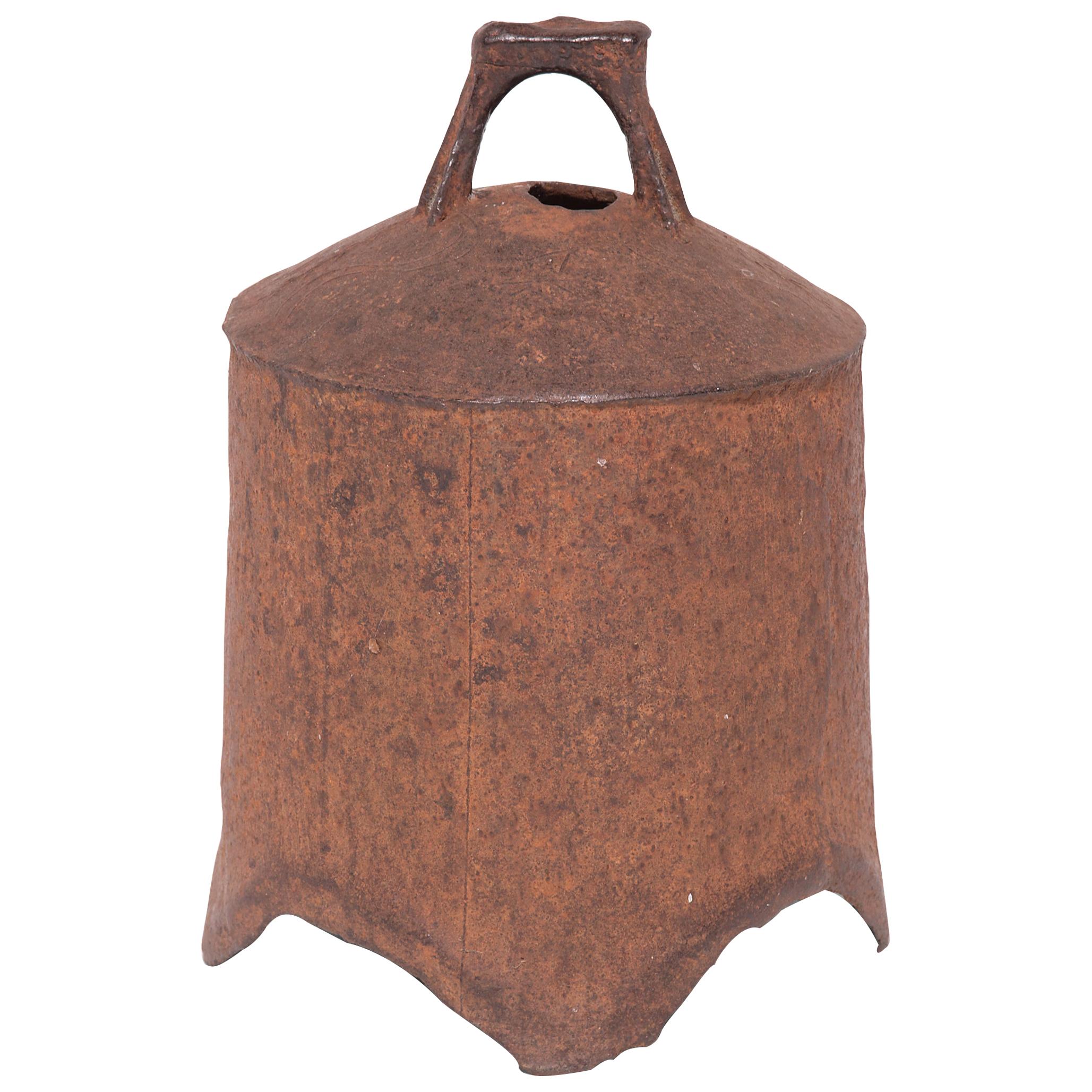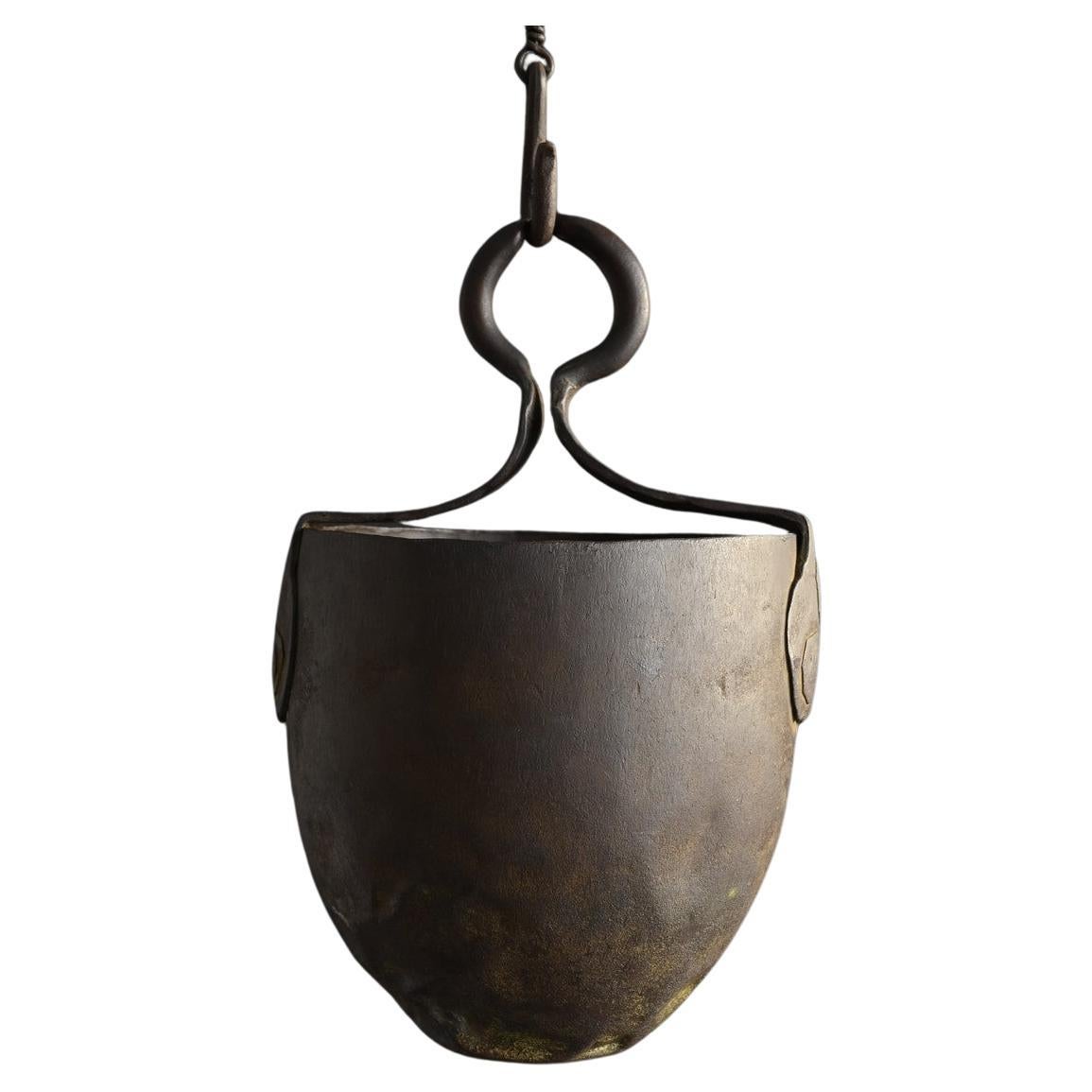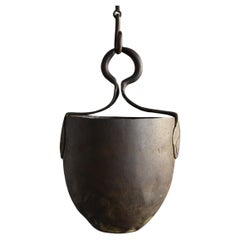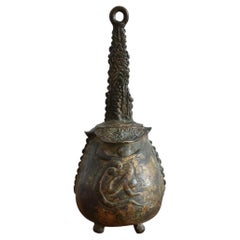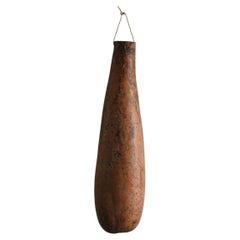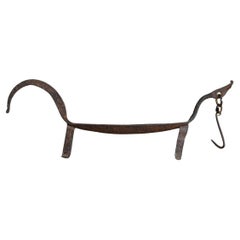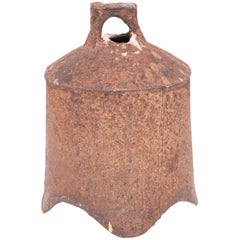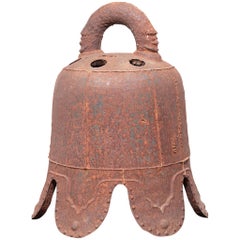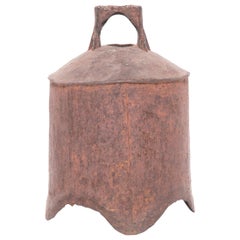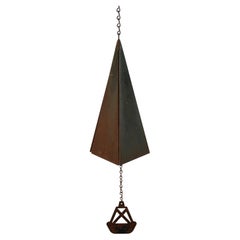Items Similar to Antique iron hanging bell from Japan or East Asia/Early 20th century
Want more images or videos?
Request additional images or videos from the seller
1 of 21
Antique iron hanging bell from Japan or East Asia/Early 20th century
$1,200
£923.12
€1,071.48
CA$1,692.29
A$1,895.65
CHF 995.66
MX$23,050.44
NOK 12,608.33
SEK 11,968.69
DKK 7,996.87
About the Item
This is an old iron hanging bell believed to have been made over 100 years ago. It is highly likely that it was manufactured in Japan, though the possibility of Korean or Chinese origin cannot be ruled out. It was used for many years in the home of a Japanese collector, where it served as a doorbell to welcome visitors, thus carrying a rich historical background as a charming antique.
Inside the bell is a clapper, called a "zetsu" in Japanese, which is the key part that produces the sound. The included wooden stick was originally tied to this clapper with a string, allowing the bell to be rung by swinging the stick. The stick bears an inscription in ink that reads, "Please ring if you need assistance," serving as a guide for visitors on how to use it.
A distinctive feature of this bell is that, unlike most Japanese temple bells which are commonly made of bronze, this one is made of cast iron. The substantial weight and the weathered patina of rust accumulated over time give it a unique presence. The rustic and robust character of iron adds a deep sense of traditional Japanese aesthetics (wabi-sabi) when incorporated into modern interior designs.
The form of the bell emulates the traditional shape seen in temples, with a basic pyramidal shape that widens towards the bottom in an elegant flared line. Its simplicity is paired with dignity, lending a serene atmosphere to any space. The worn rust and traces of age make it an irresistible piece for antique lovers.
Additionally, an old iron chain, prepared separately, pairs perfectly with this bell. Displaying them together enhances the overall sense of weight and creates a harmonious, unified look in the space. Each link of the chain carries the characteristic texture of aged iron, further accentuating the bell’s appeal. The total weight including the chain is approximately 5 kilograms, giving it a solid and impressive presence beyond what the eye perceives.
Due to its distinctive heaviness and historic charm, this bell fits surprisingly well not only in Japanese-style interiors but also in modern or industrial-themed spaces. For example, hanging it from the ceiling of an entrance or earthen floor area creates a welcoming sign full of depth and character. Its ability to be rung makes it practical as a doorbell, while also adding a nostalgic soundscape to the environment.
It is also recommended as a striking accent piece for the living room. Placing it near a window or alcove allows the rust’s texture to change subtly with light and breeze, making it an ever-changing art piece. Especially when paired with solid wood furniture or lacquerware, it enriches the traditional Japanese aesthetic of wabi-sabi.
Furthermore, hanging it under the eaves of a Japanese garden or veranda to enjoy the gentle ringing in the natural breeze is a lovely idea. If placed outdoors, be mindful of further rusting and deterioration; a somewhat sheltered spot protected from heavy rain and wind is advisable.
Moreover, using it as interior decor in shops or cafes lends an air of history and dignity to the space. Simply placing this bell in a minimalist environment conveys to visitors that the location is special and thoughtfully curated.
【Condition】
There are signs of rust and minor scratches from long-term use, but the structure remains solid. The clapper and wooden stick are included, and the bell can actually be rung. Please retie the string on the wooden stick when using. We ask for your understanding of these features as part of the item’s aged charm.
【Size and Weight】
Bell body: approx. W15.5cm × D15.5cm × H22.9cm (including the semicircular hanging ring)
Height including the S-shaped hook: approx. 30cm
Total length including the chain: approx. 197.5cm
Total weight: approx. 5kg (including chain)
Item number: OB291
[We mainly sell old Japanese items.
We've seen tens of thousands of items so far.
Taking advantage of that experience, we are posting attractive items here.
We are able to do this because we have many years of experience.
There are parts of Japan that are familiar to Japanese people but are still unknown to the rest of the world.
We will continue to offer products that will allow you to fully experience this feeling.]
About the Seller
5.0
Gold Seller
Premium sellers maintaining a 4.3+ rating and 24-hour response times
Established in 2015
1stDibs seller since 2020
1,605 sales on 1stDibs
Typical response time: 6 hours
- ShippingRetrieving quote...Shipping from: senzoku, Japan
- Return Policy
Authenticity Guarantee
In the unlikely event there’s an issue with an item’s authenticity, contact us within 1 year for a full refund. DetailsMoney-Back Guarantee
If your item is not as described, is damaged in transit, or does not arrive, contact us within 7 days for a full refund. Details24-Hour Cancellation
You have a 24-hour grace period in which to reconsider your purchase, with no questions asked.Vetted Professional Sellers
Our world-class sellers must adhere to strict standards for service and quality, maintaining the integrity of our listings.Price-Match Guarantee
If you find that a seller listed the same item for a lower price elsewhere, we’ll match it.Trusted Global Delivery
Our best-in-class carrier network provides specialized shipping options worldwide, including custom delivery.More From This Seller
View AllAntique Asian copper bucket "tsurube" /20th century/hanging flower vase
Located in Sammu-shi, Chiba
This is believed to be a bronze "tsurube" (water bucket) made in Japan or East Asia.
It was likely used to draw water from wells.
The base shows dents, possibly from repeated impacts...
Category
20th Century East Asian Other Metalwork
Materials
Copper
Chinese Antique Casting Handbell Made of Copper Alloy / Temple Bell
Located in Sammu-shi, Chiba
A Chinese antique handbell made of copper alloy.
I think it is from the late Qing dynasty to the end of the Qing dynasty.
Although it is a casting, ...
Category
Antique 19th Century Chinese Qing Metalwork
Materials
Brass, Bronze
Japanese antique long gourd flower vase/1868-1920/wall hanging object
Located in Sammu-shi, Chiba
This is an old farming tool believed to have been used in Japanese rural households between the Meiji period and early Showa era. Originally, it served as a container for storing pla...
Category
Antique Late 19th Century Meiji Decorative Art
Materials
Other
20th Century-African, Iron Object Made by the Lobi Tribe of Burkina Faso, Africa
Located in Sammu-shi, Chiba
An iron figurine made in Africa around the 20th century.
In many countries in Africa, iron objects are used for objects, coins, tools, and rituals.
Dogo...
Category
20th Century Burkinabe Tribal Tribal Art
Materials
Iron
Antique wall-hanging vase made from Japanese bamboo/River fishing equipment
Located in Sammu-shi, Chiba
This is a traditional Japanese fishing implement called an "uke," crafted from bamboo during the Meiji to early Showa period. It was placed in rivers to trap eels and loaches, which,...
Category
Antique Late 19th Century Japanese Taisho Decorative Art
Materials
Bamboo
Japanese Antique Pottery Hanging Vase/Edo/1800s/Boat-Shaped Vase
Located in Sammu-shi, Chiba
This is a black-glazed boat-shaped pottery made in the late Edo period of Japan.
This will be a hanging vase.
Pour water directly into this and decorate the flowers.
Also, perhaps this is a pottery called Seto-yaki.
Seto is an ancient kiln located in Aichi Prefecture.
Various shapes and colors were produced there, and in the late Edo period, dark glazed pottery was also produced.
When a dark brown glaze is applied, the areas with thick glaze look black, and the areas with thin glaze look brown.
I put water directly into this and left it for a day, but there was no water leakage.
I would say it is in very good condition.
Although it is a small item, it has a very strong presence.
It has a glossy and elegant appearance.
There are many types of Seto pottery...
Category
Antique 19th Century Japanese Edo Vases
Materials
Pottery
You May Also Like
19th Century Chinese Iron Bell
Located in Chicago, IL
This rustic, 19th-century iron bell once pealed in celebration or gave notice of important events in a town in northern China. Marked with holes to affix the...
Category
Antique Mid-19th Century Chinese Qing Garden Ornaments
Materials
Iron
Chinese Ming Iron Bell with Dragon Handle, c. 1600
Located in Chicago, IL
This monumental Ming-dynasty bell once pealed in a Chinese village, sounding out in celebration or giving notice of important events. Expertly forged, the cast-iron bell is detailed with characters in intricate relief, and its exaggerated scallop rim is traced with oversized rivets. Covered in scales and ending in expressive faces, the bell's handle is cast in the form of a two-headed hong dragon, thought to be the embodiment of a rainbow and thus visible only after rainfall. Frosted with snow or lit from within by flickering candles, this sculptural bell takes on a magical presence in the winter garden.
Category
Antique Early 17th Century Chinese Ming Garden Ornaments
Materials
Iron
19th Century Chinese Iron Bell
Located in Chicago, IL
This rustic, 19th century iron bell once pealed in celebration or gave notice of important events in a town in northern China. The shoulder of the bell is adorned with subtle decorat...
Category
Antique Mid-19th Century Chinese Rustic Garden Ornaments
Materials
Iron
Japanese Hand Made Garden Wind Chime
Located in Douglas Manor, NY
Japanese hand made garden wind chime.
Category
Mid-20th Century Metalwork
Materials
Iron
Provincial Chinese Iron Bell, c. 1850
Located in Chicago, IL
This rustic, 19th century iron bell once pealed in celebration or gave notice of important events in a town in Northern China. The shoulder of the bell is de...
Category
Antique Mid-19th Century Chinese Rustic Garden Ornaments
Materials
Iron
Chinese Iron Courtyard Bell, c. 1850
Located in Chicago, IL
This rustic, 19th century iron bell once pealed in celebration or gave notice of important events in a town in northern China. The bell's wide mouth and ridged bead lines give this b...
Category
Antique Mid-19th Century Chinese Qing Garden Ornaments
Materials
Iron
More Ways To Browse
Solid Wood Used Furniture
Asian Weights
Japanese 20th Century Modern Furniture
Japanese Temple
Japanese Iron
Antique Iron Key
Antique Hanging Sign
Antique Key Ring
Bell Bottom
Antique Iron Chain
Antique Cast Bells
Iron Bear
Old Bell
Old Antique Bells
Antique Bell Weights
Japanese Wood Temple
Used Veranda
Antique Cast Iron Signs
